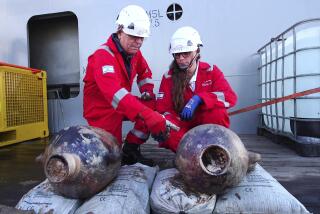Oil Tanker Sunk in 1941 Found Near Cambria
- Share via
CAMBRIA, Calif. — A tanker sunk by a Japanese submarine 55 years ago has been located, and most of its cargo of 4.1 million gallons of crude oil appears to be intact, the government reported Friday.
The 440-foot tanker Montebello was sunk Dec. 23, 1941, just 16 days after the Japanese attack on Pearl Harbor. It was en route from Port San Luis near Pismo Beach, where it had been loaded with 75,346 barrels of crude, to Vancouver, British Columbia. It went down in about 900 feet of water off Cambria, about 170 miles south of San Francisco.
The crew of 38 survived the sinking, escaping in lifeboats as the submarine torpedoed the tanker, then opened fire with its deck gun.
The wreck was visited earlier this month by two researchers in a small submarine, according to the National Oceanic and Atmospheric Administration. The researchers reported that the ship is sitting upright, home to thousands of sea creatures and littered with fishing lines and nets.
The ship rests on the southern edge of the Monterey Bay National Marine Sanctuary, and officials are worried about what might happen if the oil gets loose.
“The cargo is uncertain,” said John Robinson, sanctuary spokesman. “Indications are it should be heavy crude. We need to examine the cargo to see what condition it is in and what condition the hull is in.”
“We are very concerned,” said Terry Jackson, manager of the sanctuary. “This is a large amount of oil sitting in an aging tanker on the bottom of the sea.”
Archeologist Jack Hunter, who was on the initial dive to the wreck, said the Montebello was in remarkably good shape considering the passage of time and the pounding it took at the hands of the Japanese.
“It was like the blind men describing an elephant,” said Hunter. “All the fragile parts of the ship were crushed, such as the smokestacks, which were made of thin metal. But we could see there were no holes in the deck, and we inspected the hull very closely.”
More to Read
Sign up for Essential California
The most important California stories and recommendations in your inbox every morning.
You may occasionally receive promotional content from the Los Angeles Times.










